Hammond Apex Preblended Expanders
Hammond Apex Preblended Expanders Deals With Lead Acid Battery Negative Electrode And Provides Improved High Temperature Performance. It Significantly Improves Life & Performance Of Electrode Under High Temperature Conditions For Both Shallow And Deep Cycles. |
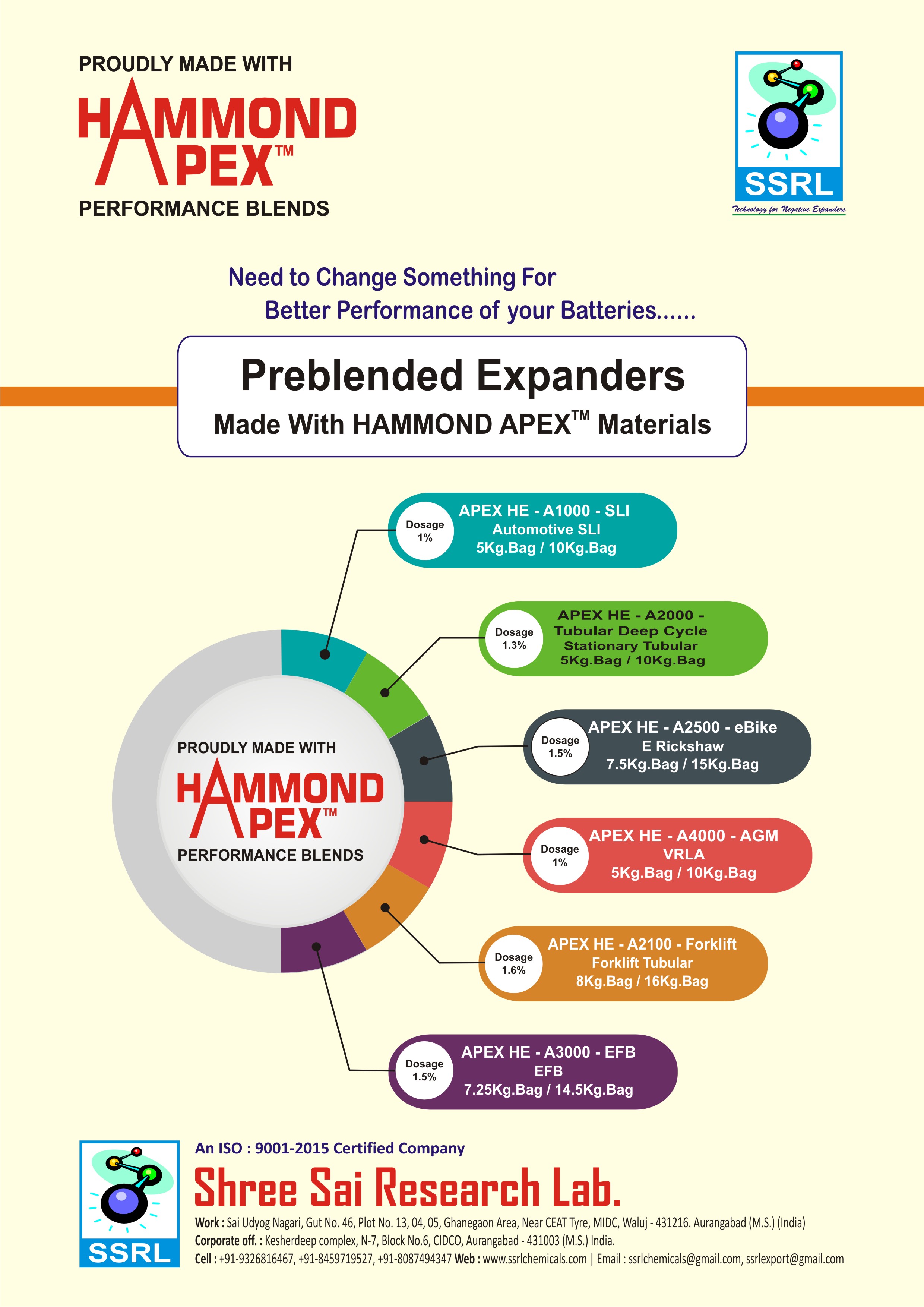 |
 |
 |
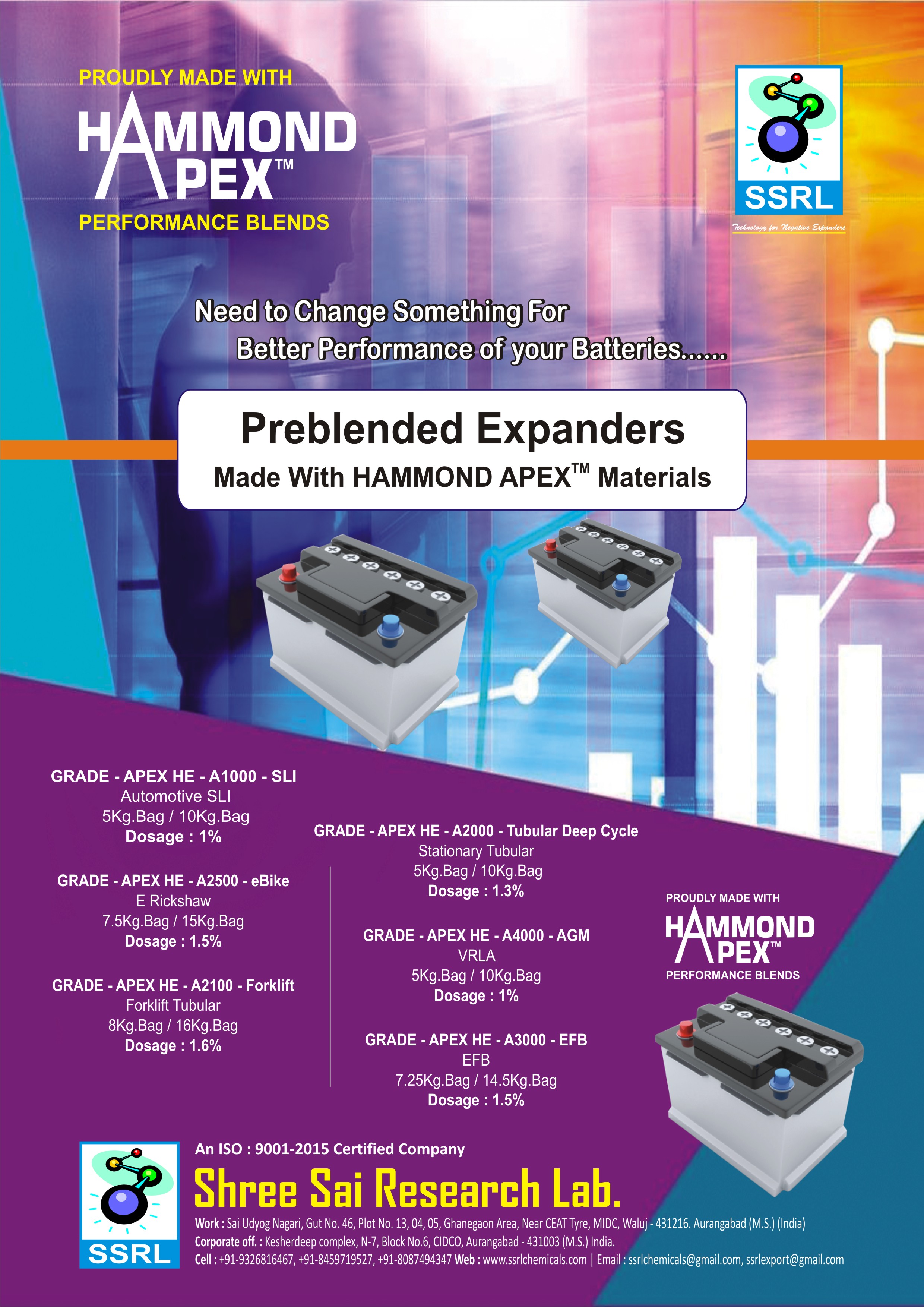 |
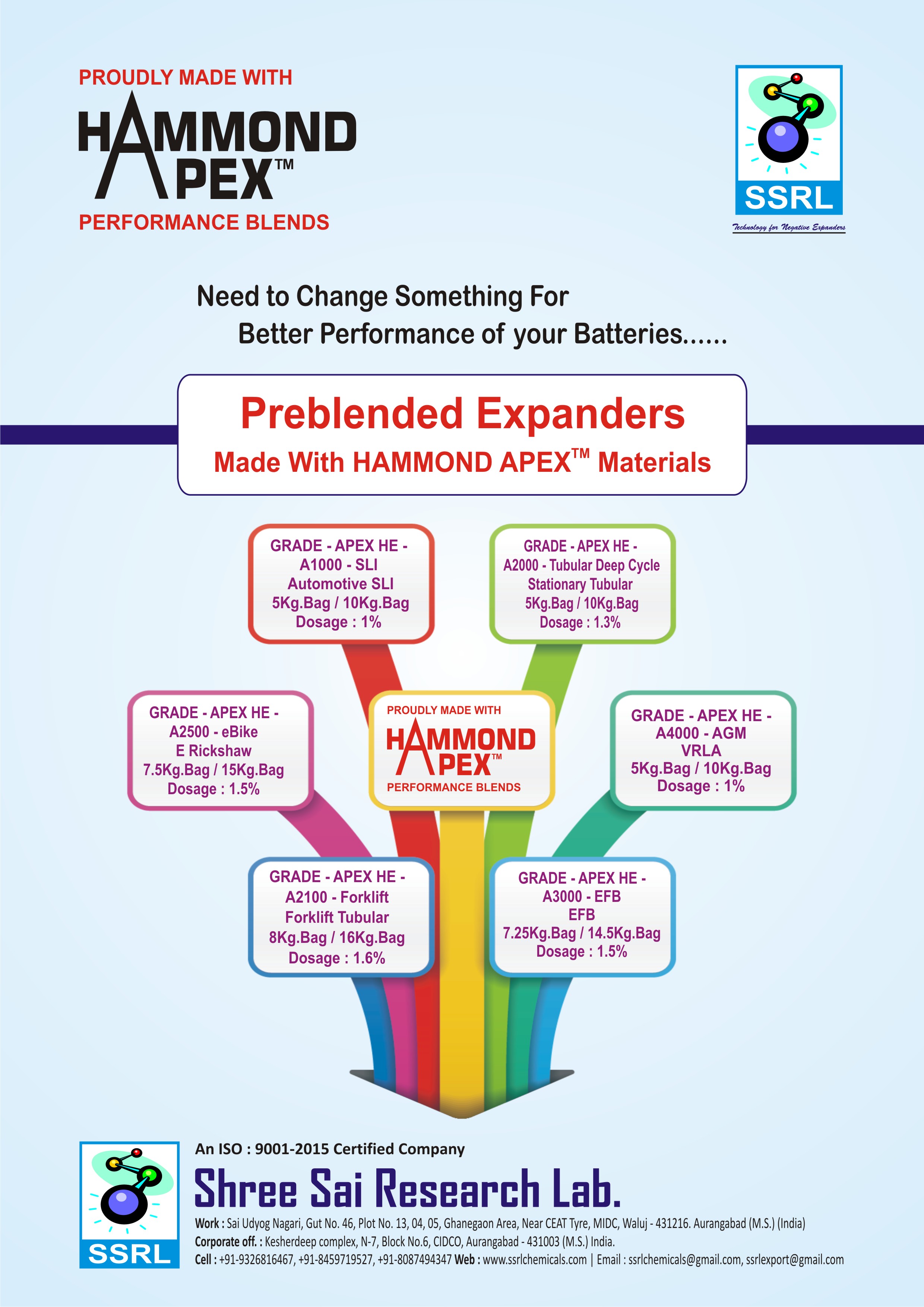 |
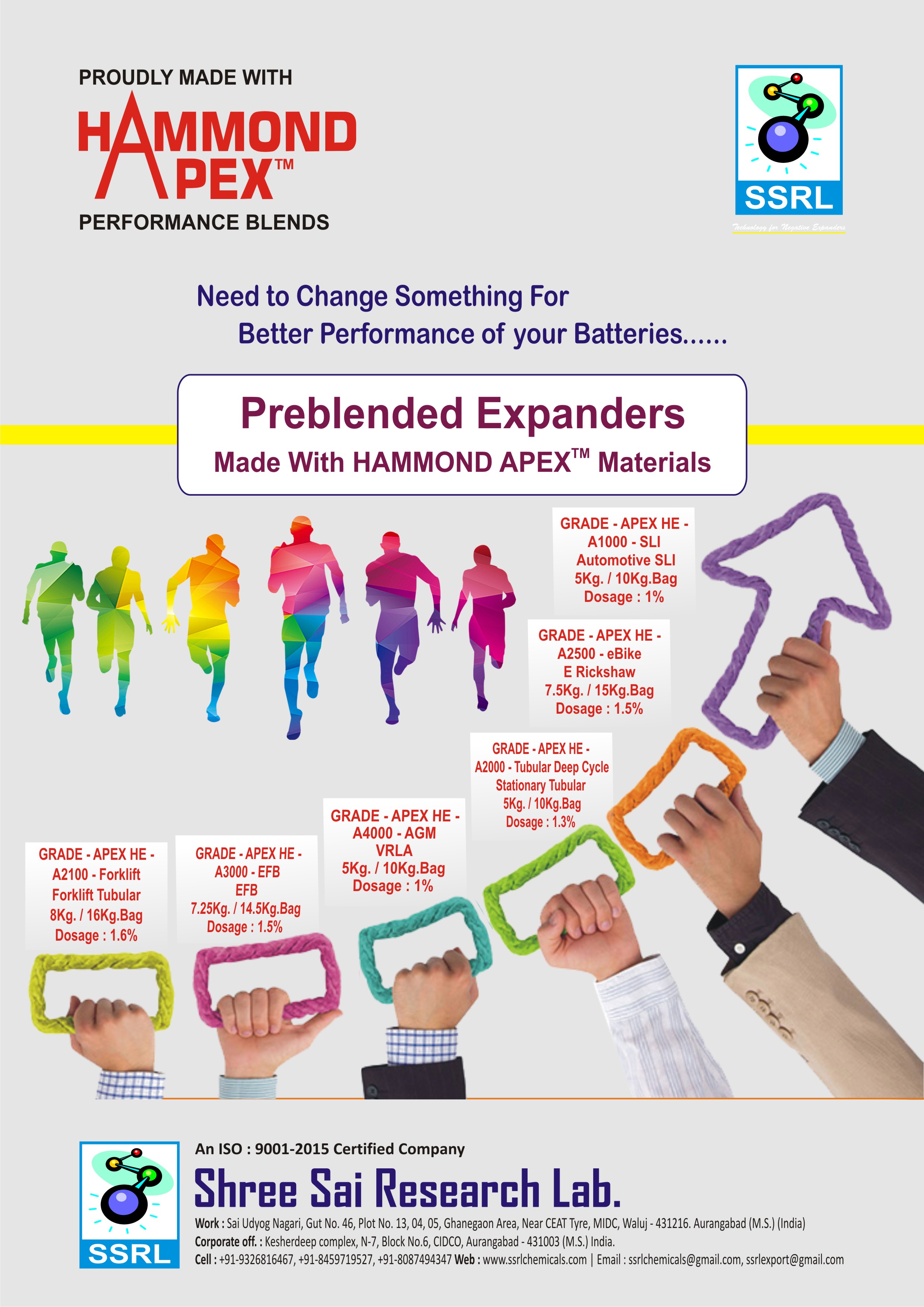 |
Below is Hammond Apex Preblended Expanders Data Sheet :
Hammond Apex HE-A4000 - AGM | Download |
Product Technical Data
Typical Properties:
Color: Dark grey to black
Consistency: Homogeneous powder
Packaging:
Varies by formulaCustomizable upon request
Recommended Usage Instructions:
Dry mix into to oxide before addition of water or acid.Impurities:
Element |
Typical (ppm) |
Maximum (ppm) |
Iron |
100 |
200 |
Copper |
100 |
170 |
Nickel |
5 |
10 |
Manganese |
5 |
10 |
Hammond Apex HE-A3000 - EFB | Download |
Product Technical Data
Description : Advanced formulation for Start-Stop applications requiring high charge acceptance, low water loss, and partial-state-of-charge cycling.
Typical Properties:
Color: Dark grey to black Consistency: Homogeneous powder
Packaging:
Varies by formula Customizable upon requestRecommended Usage Instructions:
Dry mix into to oxide before addition of water or acid.Impurities:
Element |
Typical (ppm) |
Maximum (ppm) |
Iron |
100 |
200 |
Copper |
100 |
170 |
Nickel |
5 |
10 |
Manganese |
5 |
10 |
Hammond Apex HE-A2500 - e-Bike | Download |
Product Technical Data
Description: Formulated for long cycle life for e-Bike and e-Rickshaw batteries.
Typical Properties:
Color: Dark grey to black Consistency: Homogeneous powder
Varies by formula Customizable upon request
Recommended Usage Instructions:
Dry mix into to oxide before addition of water or acid.Impurities:
Element |
Typical (ppm) |
Maximum (ppm) |
Iron |
100 |
200 |
Copper |
100 |
170 |
Nickel |
5 |
10 |
Manganese |
5 |
10 |
Hammond Apex HE A2100 Forklift | Download |
Product Technical Data
Description: Formulated to provide sustained performance for extended cycling.
Typical Properties:
Color: Dark grey to black Consistency: Homogeneous powder
Packaging:
Varies by formula Customizable upon requestRecommended Usage Instructions:
Dry mix into to oxide before addition of water or acid.Impurities:
Element |
Typical (ppm) |
Maximum (ppm) |
Iron |
100 |
200 |
Copper |
100 |
170 |
Nickel |
5 |
10 |
Manganese |
5 |
10 |
Hammond Apex HE A2000 Deep Cycle | Download |
Product Technical Data
Description: Formulated to provide sustained performance for extended cycling.
Typical Properties:
Color: Dark grey to black Consistency: Homogeneous powder
Packaging:
Varies by formula Customizable upon requestRecommended Usage Instructions:
Dry mix into to oxide before addition of water or acid.Impurities:
Element |
Typical (ppm) |
Maximum (ppm) |
Iron |
100 |
200 |
Copper |
100 |
170 |
Nickel |
5 |
10 |
Manganese |
5 |
10 |
Hammond Apex HE A1000 SLI | Download |
Product Technical Data
Description: Custom formula to optimize cold cranking performance for automobiles, motorcycles, locomotive, small engine, and starting batteries.
Typical Properties:
Color: Dark grey to black Consistency: Homogeneous powder
Packaging:
Varies by formula Customizable upon requestRecommended Usage Instructions:
Dry mix into to oxide before addition of water or acid.Impurities:
Element |
Typical (ppm) |
Maximum (ppm) |
Iron |
100 |
200 |
Copper |
100 |
170 |
Nickel |
5 |
10 |
Manganese |
5 |
10 |
Barium Sulphate | Download |
Barium sulphate is rhombic system structure similar to crystal structure to plumbous sulphate. The function of barium sulphate is to provide the core for the formation of plumbous sulphate during discharge process.To enhance the battery capacity when it added it will have two effects as there are many crystal structures.It decreases the supersaturating concentration of plumbous sulphate and condensation effect of plate when the plumbous sulphate covers the cathode to prevent the passivation of plate. When charging the battery as the fine hair like lead formed by the plumbous sulphate which includes some barium sulphate has high dispensability, so the deoxidized cathode lead formed has comparatively big specific surface area, and the same time it will remarkably decrease the viscosity and condensation trend of fine lead crystals grains. Barium sulfate functions to provide sites for precipitation of lead sulfate during discharge. It is electrochemically inactive and has extremely low solubility in sulfuric acid. These properties ensure that it remains chemically unchanged in the negative plate even after prolonged cycling. The ability of barium sulfate to act as a site for lead sulfate precipitation is due to the similar crystal structure of the two materials.
Strontium sulfate has also been shown to be an effective anti-passivating agent.By providing a large number of sites for the precipitation of lead sulfate, the barium sulfate prevents lead sulfate deposition as a thin, impermeable passivating film. The unit cell dimensions of lead sulfate and barium sulfate are so similar that less energy is expended by lead sulfate precipitating on barium sulfate crystals than if energy of nucleation was used to form a new lead sulfate crystal. In other words, lead sulfate deposits on sites where the least expenditure of energy is possible. With use of Barium Sulphate in the negative plate, there is only a slight improvement in cold capacity on the first few cycles. Neglecting to use of Barium sulphate in the negative plate at all reduces capacity of the batteries at ordinary temperatures resulting in premature failure to deliver power. Batteries from which Barium sulphate was excluded failed because of the negative plates rather than the positive plates even before the positives were worn out. The life cycle of negative plate increased from 50-150 cycles with use of Barium sulphate. With increasing proportion of Barium Sulphate, the charge voltage is not in a wider range as that with lignin.
The surface of negative plates active material without barium sulphate was not smooth. In fact, it was more or less lumpy the crystal size of lead and lead sulphate were both much larger, uneven in surface. The surface of negative plates active material without barium sulphate was not smooth. In fact, it was more or less lumpy the crystal size of lead and lead sulphate were both much larger, uneven in surface.The inclusion of 0.3% barium sulphate refined the surface of the negative active material. Using 0.6% Barium sulphate slightly further refined the plate to a smooth finish. Barium sulphate and lead sulphate have both similar crystal structures and can easily blend or merge into each other. Both Barium sulphate and freshly formed crystalline lead sulphate are porous particles.
When during discharge lead sulphate is formed and dissolves into electrolyte, it preferably precipitates back on the negative plate on those areas only where barium sulphate inhibits lead sulphate deposition or precipitation on itself. Thus,spongy lead surfaces are spared from its being covered with lead sulphate. Therefore, Barium Sulphate helps in keeping lead surfaces exposed to further attack by sulphuric acid to give a long continued discharge. Barium sulphate and freshly formed lead sulphate being porous, keep the pores in the negative plate open to further penetration of the acid into deeper most porosityhelping in the discharge process.
Specifications :
| Parameters | Result |
| Appearance | White Amorphous Powder |
| Chemical Formula | White Amorphous Powder |
| Barium Sulfate (On Dry Material) | 99% Min. |
| PH Value | 8.0 |
| Water Solublity | Non Soluble |
| Acetic Acid Solubl | 0.60% Max |
| Iron as Fe | 0.001% Max |
| Sluphide as S | 0.003% Max |
| Moisture | 0.05% Max |
| Fineenss (325 mesh sieve residue) | 0.01% |
| Oil Absorption G/100gm | 13-15.5% |
| Whiteness | 96% Min. |
| Particle Szie in micron | >1 milimicron |
| Chloride as CI | 0.0001% Max |
| Manganesse as Mg | 0.0001% Max |
| Solubility in HCL | 1.64% Max |
| Sedimentation MI/50MI | 15 |
Standard Packing: 25 kg. HDPE Bags
Storage: Store in a cool and Dry Place
Graphite Powder | Download |
This product also known as graphite or high purity graphite, look for the high dispersion of dark gray powder. Do not loose adhesion by chemical purification, centrifugation, drying, grinding system was applied to the anode plate lead-acid battery to improve the active material to improve conductivity and porosity of active material, but also in the metal lead and lead sulfate crystallization process of adjusting the distribution of surfactant, together absorb the excess surfactant to improve the charge acceptance.
Technical Specification :
| Parameters | Result |
| Appearance | Black to Grey Color Powder |
| Graphite (Fixed Carbon C)% | 99.96 |
| Ash% | 0.04 |
| MO (ppm) | <0.08 |
| Fe (ppm) | <0.06 |
| Copper (ppm) | <0.05 |
| Mesh 325 | Passes |
| Apparent Density gm/cm3 | 0.15 |
| Apparent Specific Gravity gm/cm3 | 0.2 |
Packing : 25 Kg. HDPE Bag.
Storage : Store in a Cool and Dry Place
Humic Acid | Download |
Humic Acid is natural condensation macromolecular hydroxy aromatic hydroxyl acid material,widely existing in soill,water and coal(rotten coal,wood coal and peat).industrious humic acid product is extracted from coal and is produced with proper physical and chemical treatments.Humic acid has big surface area and appears to have weak acidity and negative electrcity. It comprises a lot of hydroxyl,carboxyl,hydroxybenzene hydroxyl,quinine,hydroxyl quinine derivatives and has very good sorption and the ability to exchange cations and good condensation.Humic acid can adhere to the surface of lead and prevent the passivation period of lead,and keep the sponginess structure of lead.At the same time,the humic acid can with pb2+ and remarkably improve the low temperature performance and high fold discharge performane and enhance the battery capacity and usage of active material,prevent the plate from shrinking, postpone the passivation of plate and prolong the battery life.
Technical Specification :
| Parameters | Result |
| Appearance | Black brown or Tan powder |
| Assay | >85% |
| Ash content | < 10% |
| Iron | > 0.05% |
| Moisture Content | < 10% |
| Nitrate | Nil |
| Chlorine ion | Nil |
| Thickness(0.125mm riddled residue) | < 1.0% |
Packing : 25 Kg. HDPE Bag.
Storage : Store in a Cool and Dry Place
NAM Efficiency Activator | Download |
NAM Efficiency Activator has big surface area and appears to have weak acidity and negative electricity. It is an ideal liquefying Agent. It increases the wetting efficiency of the paste mixing, thereby bringing the water into intimate contact with the Oxide particles resulting in significant increase in workability.
NAM Efficiency Activator do not lower surface or interfacial tension and hence, they have little or no tendency to create foam. The most synthetic Naphthalene sulphonate condensates have an average number of monomer units in the range from about 10 to about 40.The sulphonated aromatic dispersant having a property to improve dispersion of barium sulfate in the paste, reduce hydro set time, and produce a stronger plate which is resistant to plate breakage, to reduce fine lead particles and thereby improve handling and pasting characteristics. It extends the life of the battery by increasing the end of charge voltage.
NAM Efficiency Activator have the ability to stabilize and to reduce the viscosity of high solids aqueous inorganic slurries of the type contemplated. These are anionic poly-nuclear aromatic compounds which have a hydrophilic backbone which is adsorbed onto the surface of the suspended lead or lead-oxide particle. Our Study shows it imparts a negative charge to the suspended particle which then repels one another. The lessening of the attractive forces between particles aids in breaking up flocks or agglomerates and forces each particle to act as a single unit. The result is a true dispersion, containing particles of optimum fineness with no agglomeration.
NAM Efficiency Activator improves low temperature performance and high discharge performance and enhance the battery capacity and negative electrode active material. It can effectively reduced the shrinkage and creep of plate, and thus an increase in strength & and prolong battery life is achieved.
NAM Efficiency Activator can adhere to the surface of lead and prevent the formation of compact non penetration anglesite layer and it will maintain the sponginess structure of lead. NAM Efficiency Activator has above characteristics it can be used on negative plates and can increase Voltage & the Conductivity of plate and the efficiency of active material, especially when the amount of plumbous sulphate crystal increases significantly in discharging process, it improves performance and conductivity of plumbous active material.
The addition of NAM Efficiency Activator increases the porous openings. It helps in the dispersibility of sulfate ions, and prevents the smaller pores being chocked. As the NAM Efficiency Activator has very fine particles it increases the surface area of electrodes and it leads into remarkable performance in cycle life.
Anti Oxidation Oil |
Not Applicable
Lignin Vanisperse A (Borregaard Norway) | Download |
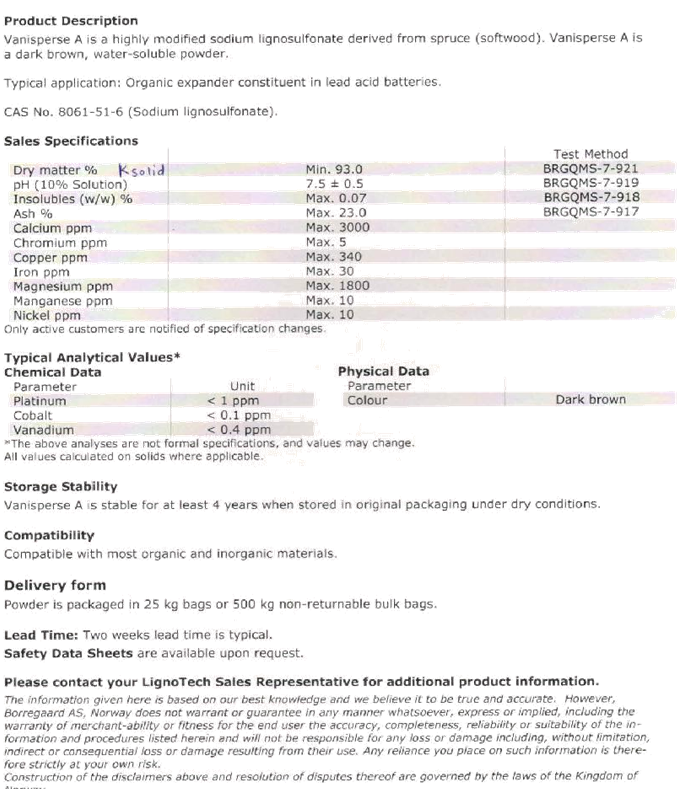
Lignin Vanisperse HT-1 (Borregaard Norway) | Download |
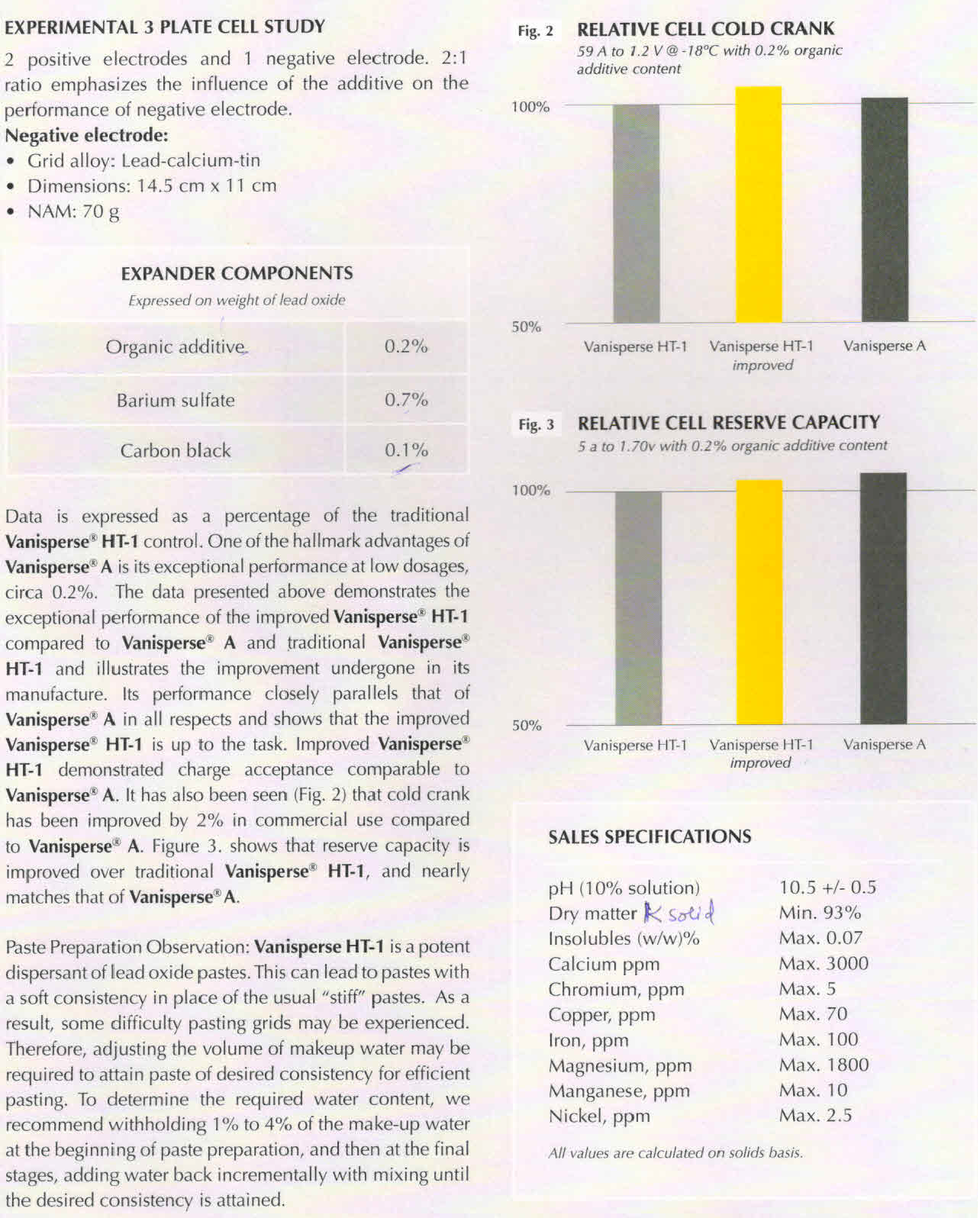
Carbon Black Phillips N330 / N550 | Download |
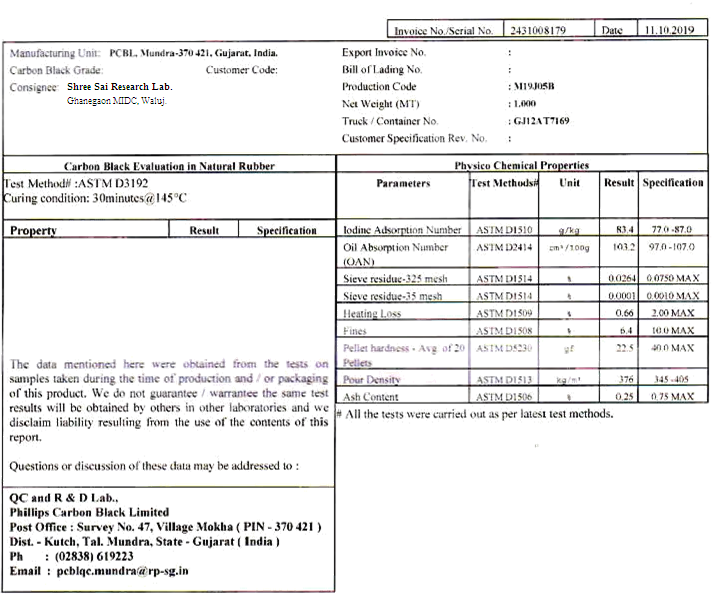
Cabot Carbon VXC72R | Download |
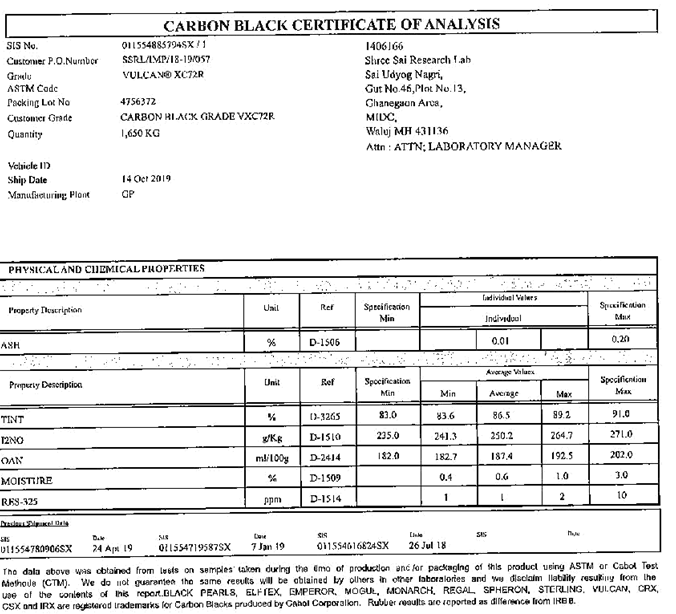
Name of Product |
Application |
Dosage |
Std. Pkg. |
Description / Benefits |
APEX HE - A1000 - SLI |
Automotive SLI |
1% |
5 & 10 Kg. Bag |
Custom Formula to Optimize Cold Cranking Performance for Automobiles, Motorcycles, Locomotive, Small Engine, and Starting Batteries. |
APEX HE - A2000 - |
Stationary Tubular |
1.3% |
6.5 & 13 Kg. Bag |
Formulated to Provide Sustained Performance for Extended Cycling with Superficial Charge Acceptance. |
APEX HE - A2500 - |
E Rickshaw |
1.5% |
7.5 & 15 Kg. Bag |
Formulated for Long Cycle Life for e-Bike and |
APEX HE - A4000 - AGM |
VRLA |
1% |
5 & 10 Kg. Bag |
Formulated for UPS, telecom and power AGM batteries. Provides long float life and high low temperature capacity with low gassing. |
APEX HE - A2100 - |
Forklift Tubular |
1.6% |
8 & 16 Kg. Bag |
Formulated to Provide Sustained Performance for Extended Cycling with Superficial Charge Acceptance. |
APEX HE - A3000 - EFB |
EFB |
1.45 % |
7.25 & 14.5 Kg. Bag |
Advanced Formulation for Start-Stop Applications Requiring High Charge Acceptance, Low Water Loss, and Partial-State-of- Charge Cycling. |